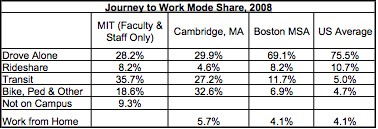The high level of transit service and MIT’s location in relatively dense Cambridge, MA are two reasons that the use of transit and non-motorized transport are higher than in other parts of the Boston metropolitan area and much higher than the US average. The table below summarizes mode choice for staff and faculty at MIT, in Cambridge, MA, in the Boston Metropolitan Statistical Area (MSA) and across the US.

The impetuses for further exploration of rideshare opportunities at MIT are numerous. First, parking on campus is becoming an expensive challenge for the Institute. The 500 leased parking spaces costs the Institute approximately $1.5M. a year in fees and in recent years, the Institute has begun constructing underground, structured parking at an estimated cost of $125,000 per space (Block-Schachter, 2009). Rideshare promotional efforts may be able to reduce the need for expensive parking construction and leasing. Second, the State of Massachusetts has begun a long-term project to rehabilitate a number of the bridges between Boston and Cambridge across the Charles River. Two of the bridges slated for closure and reconstruction, the Longfellow Bridge and the BU Bridge, are both in close proximity to MIT and will limit vehicle access to campus during the reconstruction phase. Ridesharing could be one important mitigation measure to ensure that an acceptable level of mobility is maintained in the southern part of Cambridge during the reconstruction process. Third, the Institute has made a commitment through the MIT Energy Initiative to ‘Walk the Talk’ and identify areas where energy consumption on campus can be reduced. Vehicle travel to and from campus is not an inconsequential portion of MIT’s energy footprint; two separate student theses have estimated contributions of 4 to 14% of Institute-wide energy consumption coming from private vehicle travel (Block-Schachter, 2009)(Groode, 2004). Ridesharing has the ability to provide additional transport options to the MIT community while helping the Institute ‘Walk the Talk’ on energy efficiency.